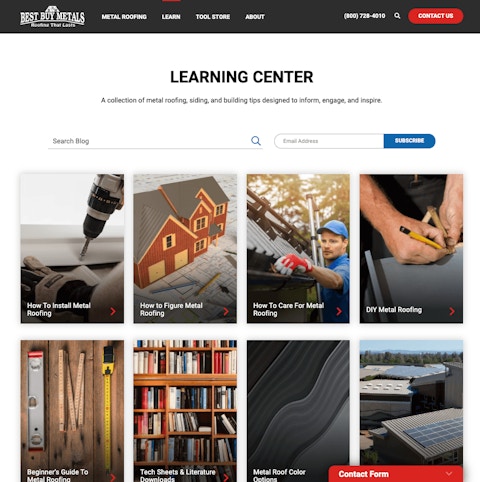More About This Show
The Smarter Building Materials Marketing podcast helps industry professionals find better ways to grow leads, sales and outperform the competition. It’s designed to give insight on how to create a results-driven digital marketing strategy for companies of any size.
In this episode, Zach and Beth chat with Mason Burchette, Director of Marketing & Development at Best Buy Metals, about how the company finds balance between manufacturing and distribution on both the homeowner and professional fronts.
Making the Jump from Distributor to Manufacturer
Best Buy Metals started back in 2002 by distributing materials from other manufacturers. And Best Buy Metals isn’t the only company to get their start in distribution. It's easier to start in distribution since there's low overhead and no capital costs for manufacturing equipment.
"The distributors are essentially employing a sales team that's not on our payroll. We'll support them and respect their territory as much as possible."
“So that was really the reason for starting in distribution, but always with the goal of manufacturing our own materials,” Mason says.
This jump from distributor to manufacturer is becoming more and more common in the building materials industry. Whether companies see the disruption on the horizon or see an opportunity to create more margin and profit if they manufacture as well as distribute, more and more are making the leap.
“If you can manufacture it the right way, there's going to be more margins there,” Mason says. “There was also a lot of gaps in this industry as far as direct to consumer sales go, especially within our niche of the industry.”
And he acknowledges the industry had a bit of a gap from a customer service perspective, which also helped Best Buy Metals take that leap from distribution to manufacturing.
Balancing Growth and Partnerships

As Best Buy Metals moved into manufacturing, how did they manage their footprint and their relationships with other manufacturers whose products they were still distributing?
Mason acknowledges it’s a balancing act. “We do distribute a number of products that we don't manufacture, and we also partner with people that distribute the products we manufacture.”
But what did that conversation look like? “Obviously the tension between selling direct and partnering with distributors is hot on the minds of all manufacturers. It sounds like you have great relationships with your distributors, but what does that conversation look like when you were first starting out?” questioned Beth.
Since Mason and his colleagues are working two channels with natural tension, they try to keep the playing field fair for their distributor partners. “Number one, we'll give them competitive pricing, so they can be competitive with our retail price in the marketplace.”
The rationale for the lower margins is a smart one though. Mason says, “The distributors are essentially employing a sales team that's not on our payroll. We'll support them and respect their territory as much as possible.”
This approach to treating distributors like an external sales team means a deeper relationship between those dealers and Best Buy Metals. They appreciate the referrals, but Mason’s team also gains a better understanding of which distributors excel at selling their products and where a direct sale to the customer is the best play.
“Distributors that partner with us and share our values and share our vision and are willing to educate themselves on our product offering, those are the partners that we like to have, to foster and to grow with.”
Future Planning

Zach has his eye on 2020. He wants to know what opportunities Mason sees for his business and for other manufacturers that may not be immediately obvious.
For Mason and Best Buy Metals, the biggest priority is educating the consumer. According to Mason, “We live in the education era. You can get on the internet and Google anything and learn about it. Homeowners are engaging in that way.”
This focus on education is a move away from the old guard of paper invoices and communication only with installers and contractors. Where those parties may be primarily interested in price, homeowners are concerned with what is the best material for their investment and for their home.
“We live in the education era. You can get on the internet and Google anything and learn about it. Homeowners are engaging in that way.”
Zach says, “So just to be clear, when you're talking about education, you're talking not about the contractor or the installer or even the builder, you're talking about the end homeowner. You're trying to educate them to create that kind of pull through. Is that right?”
That’s exactly what Mason is hoping to achieve.
“We want the homeowner to be so on about why our product is better and why it's the best fit for their home, that they essentially demand that their installer use our product. We want them to be so confident in our product that they ask their contractor to use it.”
And how are they doing that?
“As much content as we can publish on as many outlets as we can,” say Mason. Best Buy Metals posts content to their blog, YouTube channel, Facebook videos and other social media channels.
Content for Education

Zach wanted to know more about Mason’s content strategy. “I'd be very curious to know from your standpoint what content do you see as performing the best right now? What are you seeing that's working well for the different audiences that you are trying to target?”
It might be surprising that Mason’s biggest bang for his buck is installation videos, even with homeowners who won’t ever be doing an installation on their own. For Best Buy Metals, it comes back to leveraging homeowners as advocates for their products and approaches.
“There are a million different ways you can install metal roofing systems — there's not just one right way. And so people usually have confidence in a manufacturer's recommendation.”
He cites poor workmanship and shoddy installers as giving products in his space a poor reputation. “It's in our best interest to educate, not only the contractor that's actually doing the install but the homeowner as well, on correct installation procedures and what they should be watching for while their installer's putting the materials on the roof.”
"We want the homeowner to be so on about why our product is better and why it's the best fit for their home, that they essentially demand that their installer use our product."
Zach says, “So you're literally telling them, ‘Hey, as your installer's installing, look for X, Y, and Z’ to make sure that they're doing it the correct way?”
This approach may seem controversial to some, since no installer wants to feel like their work is being critiqued by a homeowner while they’re trying to get the job done, but as a manufacturer, Mason says: “Our product is only as good as the install. We can do as much as we can on the manufacturing end, but if it's installed incorrectly, you know it'll fail."
Beth agrees. “I think that's really clever. It's such a good twist to the installation How-To video. Homeowners trust the price of products, but there's this underlying feeling from homeowners that, when it comes to the installation, that's where a contractor might try to take advantage, just from the homeowner’s lack of knowledge.”
This practice isn’t something we actually see, but arming homeowners with that knowledge and comfort level of ‘I can vet myself if my installer has done a good job’ creates confidence in both the product and the installer.
Walking the Transparent Walk

As Mason puts it, “Transparency is the basis of our marketing plan.”
He acknowledges that the balancing act comes back into play, though. “It almost sounds aggressive towards the installer, and we don't ever want to come across that way either, because installers are some of our best partners.”
To improve those partnerships and maintain goodwill, Best Buy Metals offers periodic contractor certification courses on how to properly install their products. After this, those contractors are considered “factory certified,” which works as a strong marketing tool for both the contractor and Best Buy Metals.
Those factory certified installers are listed as preferred installers with Best Buy Metals’ customer service team, which is a value add to homeowners, but it goes a little farther than that.
Zach says, “So that's almost weeding out some contractors that may not be a good fit?” By educating installers on the preferred method, Best Buy Metals is asking those contractors self-select, meaning only those who fit Mason’s brand message generally finish the certification process, increasing the chances of a satisfied customer for both the installer and manufacturer.
Mason points out, “As a manufacturer, you can say that you're not liable for the install as much as you want to, but the truth is if an installer installs your product the wrong way, it's going to give you a bad name.” Regardless of whether it’s the material or installation who is at fault, the result is a frustrated homeowner who is unlikely to recommend either in the future.
The Best Advice Is…

Zach asks Mason about his best advice for listeners who are considering moving into direct sales or improving their marketing.
Mason’s advice is clear: “I feel that being transparent is probably the best strategy you can have.” Manufacturers and distributors who aren’t educating consumers are going to fall behind the curve. “If you're not the person that's getting in front of them to educate them, somebody else is going to.” And that’s the brand name they’ll remember when it’s time to buy.
“You can't cover up information. They're going to find it and if you're not the one that gave it to them, number one, they're not going to choose you. They're going to go with wherever they found the information, and number two, it's going to give you a reputation of withholding information. And nobody wants to look secretive or like they have something to cover up.”
Zach has seen many manufacturers succeed despite this ‘uncomfortability of transparency.’ He says, “We teach and talk a lot about reciprocity and building rapport. It creates that partnership that a lot of manufacturers want.”
Mason acknowledges that discomfort, but says it’s in the best interests, not only of Best Buy Metals but for the industry as a whole. “Even if it's negative information for the installer, if it's negative information for the homeowner, correct information is the right way to market. That's the way we feel.”
Got a Question?
To find out more about Mason and his marketing tactics, visit BestBuyMetals.com.
If you have questions about how to use transparency and education to improve your marketing in 2020, let us know! Shoot us an email at [email protected] with all of your questions.








